Martin Edwards's Blog
January 27, 2026
London Adventures

I'm now working busily on the final edit of the new Rachel Savernake after three separate short trips that have been hugely enjoyable. Among them was a lunch at the British Library, with the senior publishing team, to discuss a number of this year's projects. More about these soon in my newsletter. And then I wandered over to the BBC to record 'A Good Read', hosted by Harriett Gilbert (daughter of Michael). In this programme, Sir Tom Shakespeare and I discussed favourite books as well as one chosen by Harriett; it was a lot of fun and the photo shows the three of us in the studio. It was also good to have a drink with Harriett and Sally the producer in the BBC Club, chatting about aspects of crime fiction as well as some of Harriett's memories of her father.


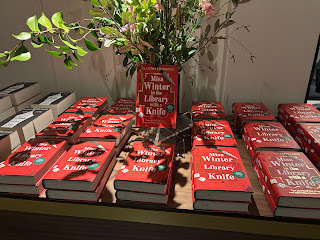
Another London trip enabled me to combine a very enjoyable Detection Club dinner with participation in the Lansdowne Literary Festival, splendidly organised once again by Veronica Hollander. The Club has a range of excellent facilities and I was able to present a tailor-made version of my 1920s murder mystery to be performed over dinner - one witness per course! The cast were great and the event was a sell-out.



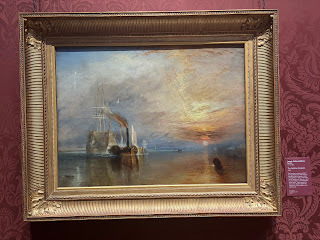
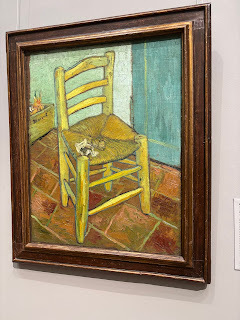
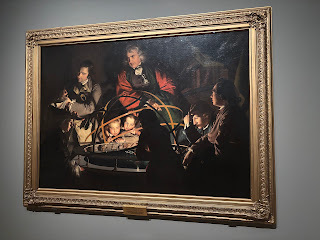
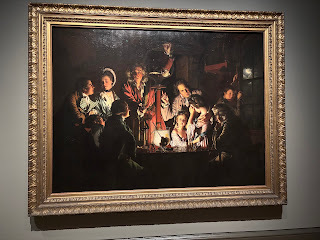
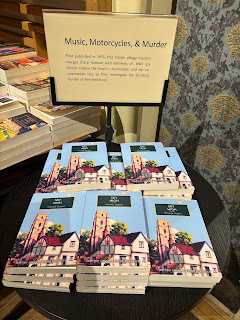
Whilst in London I had the chance to catch up a couple of times with my daughter and also to explore St James Park, which is delightful, for the first time in many years. And I also wandered round the National Gallery a couple of times - there's so much to take in there, and the current exhibition, featuring Joseph Wright of Derby, is well worth a look. I had the chance to sign books in several shops and enjoyed the coincidence of seeing a great display, in Waterstones, Piccadilly, of Michael Gilbert's Sky High, the latest British Library Crime Classic.
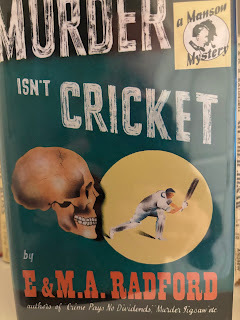
A third trip took me to the home counties and a visit to Anthea Fraser, who, I'm happy to report is still in good form and still writing. I also had the chance to stay with Nigel Moss, a great connoisseur of Golden Age detective fiction, whose company I always relish. All this travelling has been a lot of fun, and although I now need to crack on with various writing projects quite urgently, the trips have energised and motivated me. A change is as good as a rest, they say...
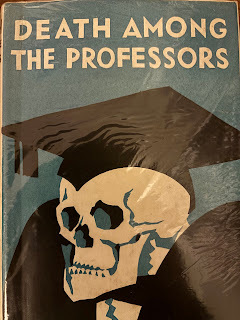
January 23, 2026
Forgotten Book - Dead Trouble
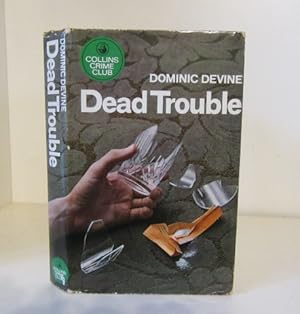
By the time he published Dead Trouble in 1971, D.M. Devine had transformed into Dominic Devine. Since his first name was David, I don't really understand this and I'd be interested to know what the thinking was. Maybe it was thought that, from a marketing perspective, initials were unappealing in the Seventies? But if so, why call himself Dominic? It's a puzzle, but frankly far less important than the mystery in the book - which, as usual with Devine, is very strong.
The opening scenes are set in Paris. A young man called Neville Richardson is looking to make the acquaintance of a particular girl; both of them are English. When someone else pesters the young woman, Neville seizes his chance. He befriends her, and although she is at first stand-offish, his easy charm steadily diminishes her resistance.
We learn that Alma Vallance, as she is called, is the daughter of a famous popular novelist who hasn't published a book for years, but is very wealthy. Alma is lovely to look at, but - to say the least - highly strung. Neville, it emerges, already knows a good deal about her. He's a chancer who has been put up to something, and it's not clear what his game is. One of the things Alma doesn't know about him is that he's married, although his long-suffering wife has thrown him out after he took one chance too many.
This is a story with many twists and turns and once again Devine shows himself to be a master of the surprising solution. His writing style is relatively plain but his stories always move at a fast pace and his characterisation is generally good and sometimes excellent. So is the way he structures his mysteries so as to keep his readers guessing. Not for the first time, I admired the way he pulled the wool over my eyes.
January 21, 2026
The Cob and Pen Award
It came as a very pleasant surprise to learn that Miss Winter in the Library with a Knife has been shortlisted for the Cob and Pen award for best crime novel, along with seven other books by a variety of distinguished authors: see below.
The key significance of literary awards from a writer's perspective is, I think, mainly to do with boosting confidence and morale, and this is an important and valuable function. Sometimes awards can bring benefits in terms of higher sales and more revenue (and over the years, when there's been a cash prize to accompany an award I've received, I've always used it to buy books that would serve as a tangible reminder of the occasion), but in the majority of cases that doesn't happen, and I don't think it matters. Because for a writer, confidence is very precious and you can't put a price on it.
I've been involved in judging literary prizes as well as being short or long listed or occasionally winning them and I think that experience over many years has given me a reasonably clear perspective. The reality is that there's inevitably an element of subjective judgment and opinion involved in these things, however hard one tries to be totally detached and objective. Again, though, I don't think that matters, as long as the process adopted is sensible and that all those involved strive to be fair-minded. It's a cliche that it's an honour to be nominated for any award, but it's true.
Twelve of my books (eight novels and four non-fiction titles) have won or been nominated for awards and that's something that gives me a good deal of pleasure. And it definitely contributes to motivation to keep writing and to keep striving to improve. Which is what I shall be doing in 2026!
Here's what the judges of the Cob and Pen award (which is associated with the Bloody Barnes crime festival, due to take place next month) had to say: 'We were thrilled at Bloody Barnes at the number of entries we received for the brand new Cob and Pen award.The judges found it all very hard to choose but here is our short list of eight - in no particular order! 'The Masked Band' by Bernard O'Keeffe 'Victim' by Thomas Enger and Jorn Lier Horst 'Blood Caste' by Shylashmi Sankar 'Dog sitter Detective Plays Dead' by Antony Johnson 'Death in the Aviary' by Victoria Dowd 'Death of an Officer' by Mark Ellis 'Miss Winter in the Library with a Knife' by Martin Edwards 'Marble Hall Murders' by Anthony Horowitz They are all a cracking good read - best of luck to them all for the next round of judging!'
Drop - 2025 film review
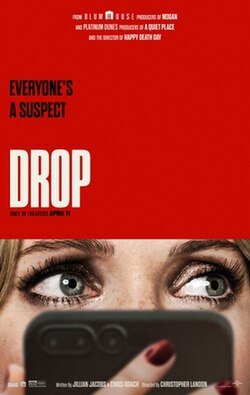
Whatever else it may lack, the recent film Drop isn't short of pace. Things happen constantly in this suspenseful film directed by Christopher Landon. The opening scenes are dramatic as a woman faces a life or death situation. Does this happen before the main incidents of the film, or at its conclusion? It's not immediately obvious (at least it wasn't to me) but soon - I thought this was a flashback, but I was mistaken - we meet the woman in question, a therapist called Violet Gates (played, very well I thought, by Meghann Fahy.
Violet is a single mother with a young son, Toby. Her sister Jen comes round to babysit, because Violet has finally got back into the dating scene, and she's agreed to meet a man, a photographer called Henry, at a very fancy restaurant with the excellent name of Palate. Henry is late, and Violet encounters a number of people, including the pianist, a female bartender, a fellow diner who bumps into her, and an older man who is also waiting to meet a first date.
Henry (Brandon Sklenar) finally shows up and an overly effusive waiter serves them. But Violet is distracted by a flurry of messages on her phone. These are 'digi-drops', sent by an unknown person in the vicinity. This person threatens Violet - unless she does what he says, her son and sister will be murdered. When Violet checks on her home security camera (the wonders of modern tech) she sees that this is no hoax - there is a masked man in her home, menacing Jen.
Tension mounts rapidly as Violet tries to find out what is going on and who is sending the messages, and why. I thought this plot - complete with chilling moral dilemma - worked really well until shortly after the revelation of the culprit. What happens in the film after that is rather cartoonish, a sequence of melodramatic events that are lacking in the originality of the bulk of the storyline. A pity, because a potentially excellent, if pulpy, film is turned into something like the same-old, same-old.
January 19, 2026
Masquerade - 1988 film review
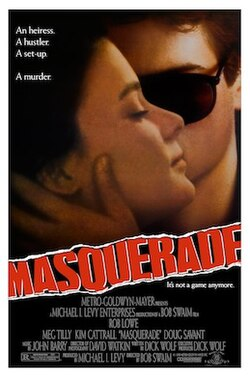
Masquerade is a film often categorised as 'neo noir', although like Body Heat, for instance, events are swathed in sunshine rather than darkness. It's a glossy piece of work which dates from 1988 but has worn pretty well, even if there is more nudity than you'd be likely to find in similar movies today, in the age of the intimacy co-ordinator. Dick Wolf (best known for Law & Order) was responsible for the Edgar-nominated screenplay, and his plotting proved skilful enough to hold my attention from start to finish.
The setting is The Hamptons, playground of the rich, and some critics have read into the script a commentary on classism in the United States. This is an element of the story, to be sure, but a relatively minor one. There's no doubt that the emphasis is on mystery and plot twists, and I'm not the person to complain about that!
Rob Lowe plays Tim Whalen, a young yacht captain who is having an affair with a married woman (Kim Cattrall, very glamorous). He meets up with Olivia, a young heiress (Meg Tilly), whose mother has recently died, and who is living unhappily with her stepfather and his latest girlfriend. Olivia also encounters a childhood friend, Mike McGill, who is now working as a local cop.
Motives for murder - sex, money, jealousy - swirl around as one death follows another. We are certainly in 'trust no-one' territory with this storyline. The film also benefits from a typically lush score by John Barry (who also wrote a superb soundtrack for Body Heat, and whose style of composition was very well suited to this type of storyline). Reviews of the film on its release were mixed, but I think it's a very good example of its kind. Not in the same league as Body Heat, but then I would say that's the best neonoir film ever made.
January 16, 2026
Forgotten Book - Reduction of Staff
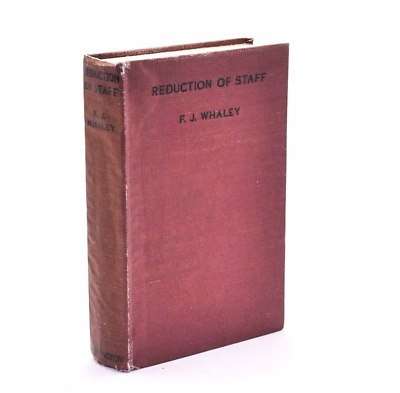
Francis John Whaley (1897-1977) was an obscure Golden Age detective novelist whose books have long since vanished from sight, with the exception of his second, Trouble at College, which was republished by Ostara in its series of Cambridge mystery reprints some years back. Whaley was a Cambridge man himself: he studied history at Corpus Christi College, although his academic career was interrupted by the war, in which he earned a Military Cross for his bravery before being invalided out of the army.
After finally graduating, Whaley became a schoolmaster, spending several years at St Bees in Cumberland, where he met his future wife (her first husband named him in a divorce petition), whom he married in 1938. Before that, he had in 1936 published his detective fiction debut, a novel pleasingly entitled Reduction of Staff. On the principle of 'write what you know', it is set in public school and narrated by a Cambridge man who also writes fiction.
Judged by the standards of Golden Age mysteries, Reduction of Staff strikes me as a pleasing effort. The narrative style is readable, and as a result, although I guessed the culprit (not difficult) and saw through the red herring involved in the first murder, this didn't spoil the book for me. The precise means by which the crime was committed eluded me, as it usually does, because the 'howdunit' element of books of this kind appeals to me much less than 'whodunit' and 'whydunit'.
As regards motive, there are some relevant facts which are not disclosed to the reader (I also wondered if the motive drew some slight inspiration from events in Whaley's private life), but overall I rather liked this novel. Whaley wrote nine mysteries in all, but by the time his short career came to an end in 1941 he had turned to espionage rather than detection. After the Second World War he taught in Sussex, but he seems to have lost interest in writing, even though he lived into the era of Colin Dexter and Inspector Morse. His obscurity is unsurprising, but this book at least is worth reading.
January 14, 2026
Alone - 2020 film review
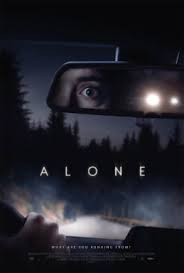
Alone is an American film, shot in rural Oregon, which is apparently a remake of an earlier Swedish film called Gone; both movies are scripted by Mattias Olsson, but certainly Alone is minimalist in its approach to dialogue and is very heavily dependent on the two lead actors. Fortunately, Jules Willcox is outstanding in the role of Jessica, a troubled woman menaced by a psychopath played by Marc Menchaca, and her performance elevates this movie from the routine same-old, same-old into something rather more compelling.
At the start of the film, Jessica is relocating from her home in Portland. She is in touch with her parents but has a difficult relationship with her mother and it's not clear what is going on or what her plans are. She has loaded her possessions into a trailer which she drives along the endless quiet roads - until a driver of a black jeep starts to behave disturbingly.
She has more than one encounter with the driver (Menchaca) and it's clear that there's something creepy about him, even though he purports to be friendly. The tension builds as Jessica resists his initial attempts to establish some kind of connection with her. But he refuses to let go...
I won't say much more about the plot, even though its development is not exactly unexpected. Films about psychos do tend to have a certain familiarity. But graphic violence is avoided for most of the film; the suspense develops as much by implication and suggestion, and Jules Willcox's acting enables her to convey a formidable range of emotions even when she doesn't say a word. Alone is worth watching for her acting...alone.
Thelma and Louise - 1991 film review
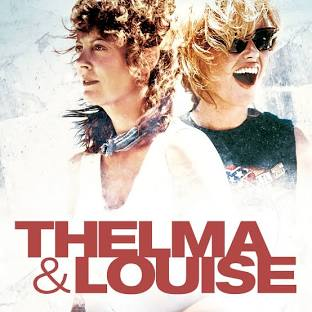
Thirty-five years have passed since Ridley Scott's film Thelma and Louise was first released, to much acclaim. On first viewing, decades ago, I was very impressed, but I decided to take another look at it, to see if I liked it as much after so much water has flowed under the bridge. And if ever a film set in the 90s has stood the test of time, it's Thelma and Louise.
You could call this a feminist film, a buddy movie, a crime film, a revenge thriller, or a black comedy; none of these labels are wrong, but none of them is broad enough to encompass the full range of Callie Khouri's impressive screenplay. There are some very dark moments indeed, but there's also a lot of variety, peaks and troughs of action and emotion. All as impressive today, in my opinion, as they were at the time.
Thelma (Geena Davis) is a beautiful but unsophisticated woman married to a carpet salesman who doesn't value her. Her pal Louise (Susan Sarandon) is a feisty waitress who has encouraged her to go on a vacation as a means of escape from their unsatisfactory lives. When Thelma's naivete gets her into trouble, Louise's temper flares up with disastrous results.
From then on, the pair are fleeing, not just from the police but from the lives they knew. They find a kind of liberation together, but it comes at a huge cost. I admire the way the script charts the evolution of their relationship and the film has one of the great, iconic endings, right up there with favourites of mine like those in movies like Don't Look Now and The Long Good Friday. Harvey Keitel plays a sympathetic cop effectively (it's not true, I think, to say that this film is anti-men) and Michael Madsen and Brad Pitt also have key roles. They are all very good, but the film belongs to the two leads. And to Scott, who is such a fine director.
January 12, 2026
David Roberts R.I.P.
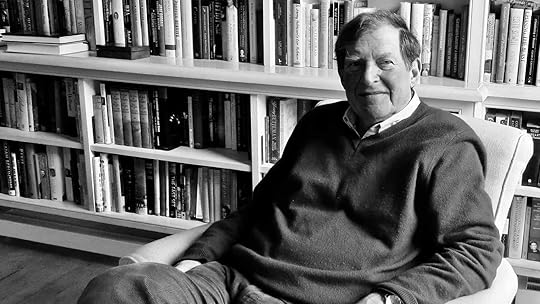
I was saddened to learn recently, from his widow Jane, that David Roberts died on 18 December. The news came as a particular shock as I'd very much enjoyed David's company at a Detection Club dinner at the Langham Hotel on 7 November. He was in excellent form that night, even though he'd not been in the best of health, and he wrote to me after the dinner to say how much he'd enjoyed the evening. I was looking forward to seeing him again this year.
David had a distinguished career in publishing lasting over thirty years - he ultimately became an editorial director - before he turned to writing detective fiction. Sweet Poison (2001) introduced Lord Edward Corinth and Verity Browne, and the book, set in the 1930s, reflected his love of Golden Age fiction. Sweet Sorrow (2009) was the tenth and last in the series.
I knew David mainly through the Detection Club rather than the CWA, and he kindly contributed twice to Club books that I edited. 'Unfinished Business' is a story which appears in Motives for Murder, our tribute to Peter Lovesey on his 80th birthday and David paid homage by writing a nice tale about Peter's first detective, Sergeant Cribb. As far as I know, this story was David's last piece of published crime fiction.
When I invited David to contribute to Howdunit, our book about the art and graft of crime writing, he wrote an incisive piece about the changing face of publishing. He was ideally qualified to write it, of course.
From time to time, he'd drop me a nice email about books like The Golden Age of Murder or the British Library Crime Classics and it was always nice to talk to him. He was a charming and popular man, and I'm so sorry that he's gone.
January 9, 2026
Forgotten Book - The Precious Gift
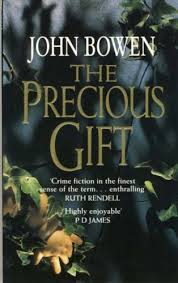
Sometimes, one can own a book for a very long time before getting round to reading it. Well I can, anyway. It's not a habit I'm proud of, but it feels more or less inevitable, since although I read a lot of books each year, I acquire even more. This is my excuse for not reading John Bowen's The Precious Gift since I acquired the paperback edition in 1993 - alas, it was a review copy that I didn't have time to review. My mistake...
John Bowen was a novelist and playwright, but possibly best known as a TV scriptwriter (not to be confused, by the way, with T.R. Bowen). Among many other credits, he wrote for Wilde Alliance and co-created Hetty Wainthropp Investigates. The Precious Gift first appeared in 1992 and bears laudatory quotes from Ruth Rendell and P.D. James, neither of whom scattered praise around lightly. So why I took so long to read it, I really can't explain.
I'm so glad I finally did read this novel. The writing is excellent, with an undercurrent throughout of dry wit. It's interesting for several reasons, and especially because he chose as a protagonist a young woman with a small baby. Risky, but I think he succeeds admirably in capturing the character and lifestyle of Sarah Arnott, a stubborn yet likeable woman whose life changes forever after the discovery of a skeleton in the grounds of the house she shares with her husband Simon.
The skeleton is of a youngish woman who was pregnant and who must have been dead for more than forty years. It's clear she was murdered and buried to hide evidence of the crime. Sarah becomes obsessed with trying to find out who she was and what happened to her, taking her lead from detectives in Crime Club novels (these references supply part of the fun). One might quibble that the motive for the crime, when eventually uncovered, is a bit far-fetched, but no matter. This really is a very good story, which had me gripped from start to finish.



